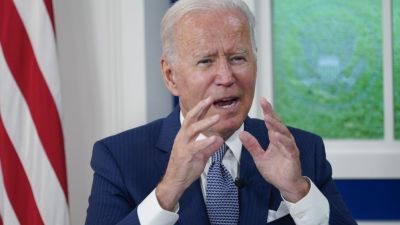Joe Biden doubles US donation of Covid vaccines to poorer countries to one billion doses

The United States will double its donation of Covid-19 vaccines to poorer countries to one billion doses, in a bid to inoculate 70% of the world's population within the next year, Joe Biden has announced.
The US president encouraged nations to do more to tackle the coronavirus pandemic in a meeting with world leaders, which was convened virtually on the sidelines of the United Nations General Assembly.
The US promised to buy another 500 million vaccines, bringing its total commitment to 2022 to 1.1 billion doses.
About 160 million vaccines purchased by the US have already been distributed to more than 100 countries, which is more than the donations from the rest of the world combined.
The UK has pledged to donate 100 million doses.
“To beat the pandemic here, we need to beat it everywhere,” Mr Biden said.
He called on wealthier countries to donate rather than sell vaccine doses to poorer nations, and to provide them “with no political strings attached".
The European Union committed to donating 500 million doses - a slight increase from its earlier plans.
In a joint statement with the US, it called for other countries to "double their dose-sharing commitments or to make meaningful contributions to vaccine readiness".
The US will also increase its funding to global aid groups administering shots.
The move by Mr Biden comes as leaders of developing nations, aid groups and global health organisations spoke about the slow pace of global vaccinations and the inequality of vaccine access between wealthier and poorer nations.
Coronavirus: What you need to know - Why are the Covid care heroes so unhappy about the new £12 billion social care tax?
The American response has also been criticised for being too modest as booster shots will be given to tens of millions of Americans before people in developing nations have received a first dose.
There are worries that the lack of vaccine access in other countries could lead to new and more dangerous variants appearing.
More than 5.9 billion Covid-19 vaccine doses have been given out across the world over the past year, representing 43% of the global population.
But some lower-income nations have not even managed to vaccinate 2% or 3% of their population.
The World Health Organization (WHO) said only 15% of promised donations of vaccines have been delivered and that countries should make shots available for poorer nations “immediately”.
It appealed to wealthier countries to avoid wide rollouts of booster shots so doses can be made available to health care workers and vulnerable people in developing nations.
COVAX, the UN-backed program to share vaccines to low-income nations, has also struggled with production issues and supply shortages.
It has missed nearly all of its vaccine-sharing targets.
The target for the number of vaccines to be shipped by the end of this year has been lowered from two billion doses to 1.4 billion now - but even that mark could be missed.
As of Tuesday, COVAX had shipped more than 296 million doses to 141 countries.
Oxfam America’s President and CEO Abby Maxman said: “Today’s summit was full of speeches but tragically lacking in action.
“While we commend President Biden for rallying world leaders to commit to vaccinate 70% of the world by this time next year, we have yet to see an effective plan to meet this goal.
"President Biden and leaders of rich countries should listen to what leaders from developing countries are asking for: the rights and the recipe to make their own vaccine doses.”